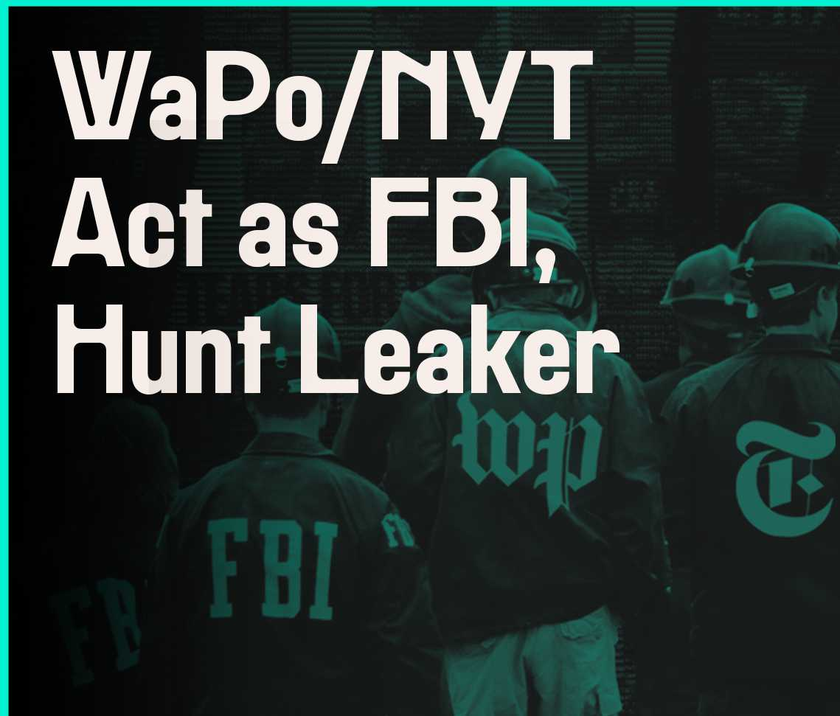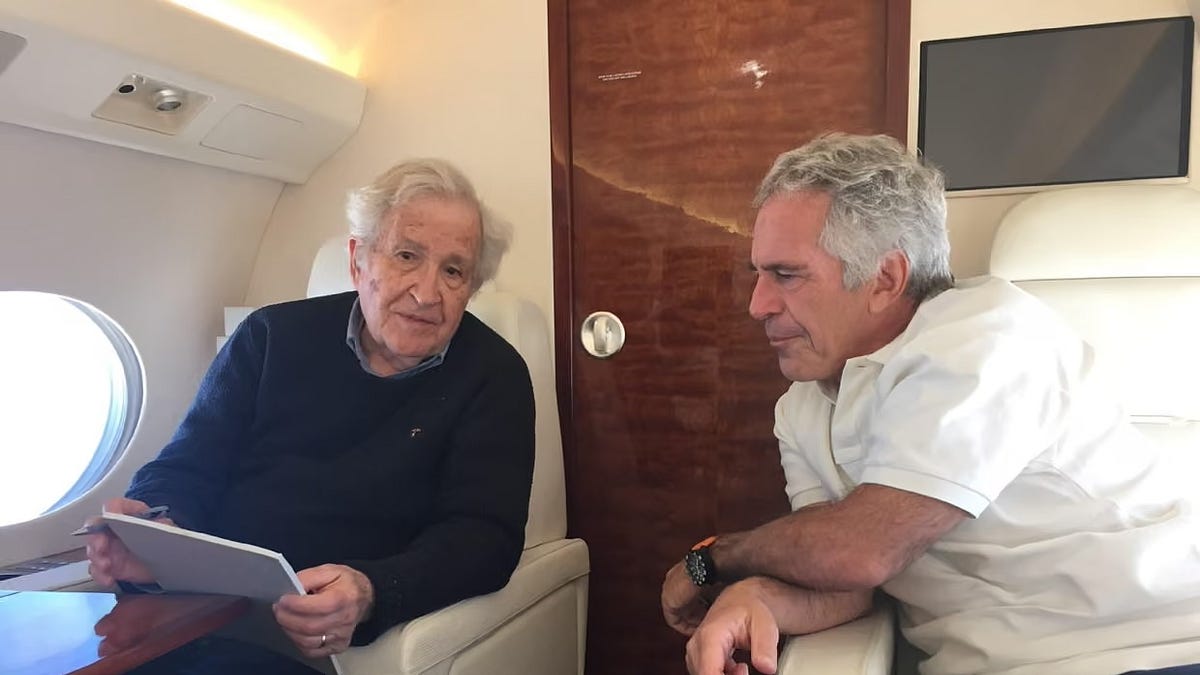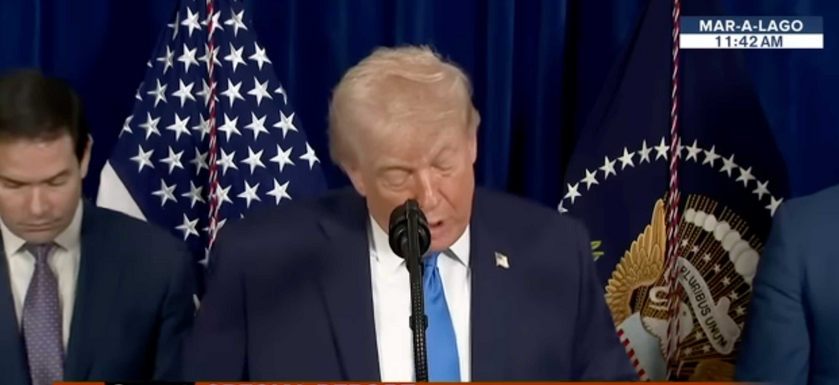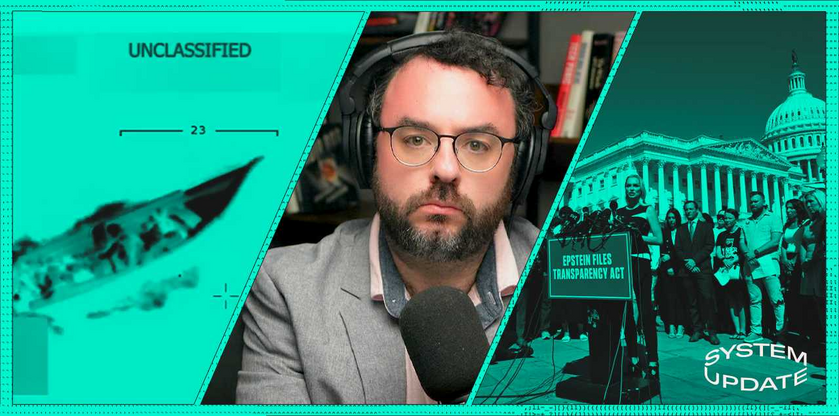The FBI arrested a 21-year-old whom they claim is the person who leaked dozens of classified documents on the Internet showing far greater U.S. involvement in the war in Ukraine than had been previously acknowledged by the Biden administration. But it was not the FBI that hunted down and found the accused leaker, Jack Teixeira, of the Massachusetts Air National Guard. Instead, it was two newspapers – The Washington Post, which early this morning provided every possible detail about the leaker to enable the FBI to identify and find him, and then, The New York Times, which named him, outed him before the FBI could find him itself. They've now arrested him as a result of the work of those two newspapers. It was their work in conjunction with the site Bellingcat, funded by both the United States government and the EU, that enabled the FBI to find and apprehend the alleged leaker.
The idea of journalism, ostensibly, in theory, is to bring transparency to what the most secretive and powerful institutions are doing in the dark. Exactly what this leak did. Why, then, would self-proclaimed journalism outlets do the job of the FBI and hunt down the leaker and boast of the fact that they were the ones who found him even before the FBI did? Why would a 21-year-old with the National Guard, whom the BBC describes as holding the rank of airman first class, “a relatively junior” position, have access to what media outlets have been claiming are the government's most sensitive and potentially damaging secrets?
As we have been reporting and demonstrating since Trump was inaugurated, the function of the U.S. corporate media has always been to act as propagandists and messengers for the U.S. Security State. But in the Trump era, this relationship even intensified further as the CIA, FBI and Homeland Security became the most valuable allies – the leaders of the ongoing attempt to sabotage Trump and his movement.
Still, the only thing more bizarre and twisted than watching journalists turn themselves into the leading advocates for Internet censorship is watching them so eagerly and explicitly dedicate themselves to doing the work of the FBI by hunting down and exposing leakers of classified documents, handing their head on a pipe to the U.S. government. And yet that's exactly what media outlets did. We’ll examine all of the implications of that.
For now, welcome to a new episode of System Update starting right now.
There aren't many ways to define the function of a free press and what journalism is without referencing the way in which journalists are supposed to bring transparency to the most powerful institutions. Nobody needs a free press to bring to the public the messages of institutions of authority and power. They're very capable of doing that themselves. There would be no value to a free press if that's all they did. If every day you picked up the New York Times and The Washington Post and read what you, in fact, read in those newspapers, which is X, Y, and Z happened, according to government officials. That's the framework - the standard metric for how media outlets report. But if they don't expose government secrets that the government doesn't want you to know, there's really no value to a free press because it's not serving as a check and adversarial check and institutions of authority, which is the foundational reason why a free press matters.
If you read the Founders, the entire idea of checks and balances included what they called the fourth estate, which, though not part of the government, is nonetheless a crucial part of the framework to maintain a balance of power between various institutions, knowing that there are people out there who are doing journalism, who are using what was then the printing press, and now as all kinds of other technology, to check what institutions of authority are saying to you, what you can reveal, what they're trying to hide. It was one of the most crucial ways to keep these institutions of authority honest. One of the ways, arguably the only real way, that we, as journalists, now have to show the public what these institutions of power are doing in the dark is through leaks. Leaks of the things that they don't want you to see oftentimes being classified information.
Classified information is not some sacred text. Classified information is nothing more than a document or a piece of information that the government has stamped on that word “classified” or “top-secret,” because they want to make it illegal for you to learn about it. That's the effect of calling a document classified or top secret. And one of the things I learned in working with many large archives of government secrets and classified material is that, more often than not, when the government calls something classified or top secret, it's not because they're trying to protect you. It's because they're trying to protect themselves. They're trying to make it illegal for anybody to show what it is that they're saying and doing in the dark because what they're saying and doing in the dark is composed of deceit, corruption, or illegality. And that's why the most important journalism over the last 50 years, beginning with the Pentagon Papers, through the WikiLeaks reporting, the Snowden reporting, and all kinds of other major investigations have taken place when people have been able to show you, the public, documents and other information that people inside the government wanted you not to see and made it illegal for anyone to show it to you. That's the dynamic between actual journalism on the one hand and powerful institutional state actors on the other. That is always supposed to be what that relationship is about.
But along the way, over, not since just Trump, but over the last many decades, the largest media corporations in the United States – The New York Times, The Washington Post, NBC News, CNN – have become the opposite of adversarial to intelligence agencies. They have become the leading propagandists, the leading messengers, whenever the CIA or the FBI or Homeland Security wants to disseminate propaganda, they go to those their favorite media outlets, their favorite journalists. They tell them what to say. And those journalists then go and say it.
Oftentimes, it's presented as a leak to make you feel like it's unauthorized. They'll refer to anonymous sources to make you kind of evoke that sentiment of Deep Throat meeting the Watergate reporters in a garage and passing information, even though that kind of original transaction that is supposed to have that image pop into your mind itself is highly suspicious. But that's what most leaks are when they're given to places like The New York Times and The Washington Post. They have the theater, the appearance, the costume of being unauthorized but, in fact, they're completely authorized. So, the CIA goes to Natasha Bertrand, now at CNN, and tells CNN and tells her to say that Hunter Biden’s laptop is Russian disinformation or that Trump has been found to have a secret server with the Russian Alfa Bank, or that Russians have put bounties on the heads of American soldiers and Trump is doing nothing about it, all of which turned out to be totally untrue. Or the FBI goes to Ken Dilanian or the CIA goes to Ken Dilanian, NBC News, and tells him that the Russians are using some kind of super-advanced machine to attack the brains of service members and diplomats in Havana and around the world, the Havana syndrome, to make you think that Trump is allowing Russia to attack our service members without doing anything about it. This is propaganda and deceit. These are authorized leaks in the government and that's, of course, where Russiagate came from. it's how the Bush and Cheney administration sold the country on the lies that Saddam Hussein had weapons of mass destruction by going to The New York Times and The Washington Post and ABC News and feeding them instructions about what they should say and then, those newspapers mindlessly put it on the front page of the newspaper. And so, we learned from the Iraq war, from the War on Terror, and then from the Trump years, including Russiagate, that the real function, the actual function of these media outlets is not to be adversarial at all to intelligence agencies or to the U.S. government but to be their servants, their messengers, their allies, their propagandists. And oftentimes they'll go so far as they did in Russiagate, to even give themselves Pulitzers when they publish information and disseminate information to the public that came directly from the CIA and the FBI, even though it turned out to be totally false.
So, the fact that this relationship, on the one hand, between the largest media corporations in the country and, on the other, the intelligence community, in particular, is one of subservience and collaboration is something that we have been writing about and reporting on and talking about for many years. But what happened in the last 48 hours is really a new manifestation of it. It's a completely new escalation. What they're really telling you is they don't even want to pretend anymore what their real function is. They are basically acknowledging to you that their role is to act as servants for the FBI and the CIA.
As you know, we've been covering it on our show. There has been a leak of dozens of classified materials, some of which have been labeled top secret. But as we reviewed, there's really nothing particularly dangerous about any of these revelations. There's no even viable argument that it's putting people in harm's way. They don't contain any names of undercover agents in the field. There's nothing in there that is even particularly sensitive. And we try to dissect these documents to demonstrate to you, based on my experience of many years of working on many different archives of classified information with WikiLeaks and the NSA, that these are not the kind of documents that are really the most sensitive secrets. That's clear and obvious. But that doesn't mean that they are bereft of important revelations. They do have some important revelations. Some of them show, for example, that the United States, contrary to the claims of the Biden administration, has deployed U.S. Special Forces inside Ukraine and there are other NATO countries, including the U.K. and Latvia and others that have done the same. Of course, that's something we ought to know if the government is more involved in the war in Ukraine than they've been telling us. And we'll go through some of the other important revelations, including the fact that the United States government is saying there will be no resolution to the war in Ukraine through 2023. There will be no negotiations, there will be no diplomatic settlement, there will be nothing but ongoing grinding, endless war that you will pay for beyond the $100 billion already authorized. That was the purpose of this leak, to show people that the Biden administration has been deceiving the public about the role that we're playing there and about what our objectives are.
And there are other important revelations here as well. And yet The New York Times and The Washington Post, instead of protecting sources, which is the role of journalists, instead, has led the way to hunt down this source, to hunt down the leaker, to dig in an investigative way to find out who this leaker is and hand that information over to the FBI. They're handmaidens now of the FBI. I've never seen anything like it before. As journalists, we're supposed to rely on leaks. That's what we need and use in order to do our reporting. The idea that a journalist would be the one to actually go and find out who this leaker is and then reveal it publicly to the FBI is something that, honestly, I didn't even think I would see, notwithstanding that, there are few people who hold them in greater contempt than I do.
Let's look at what's really going on here. First, what they did and the broader context of what the corporate media has become in terms of its relationship to the intelligence community. So, as I said earlier this morning, The Washington Post published a lengthy article, the title of which was “Discord member details how documents leaked from closed chat group.” It was out last night and so, a lot of people saw it first thing in the morning. This was essentially a blueprint for the FBI to find exactly who this leaker was and where he was. It penetrated the Discord group, the small Discord group, where these documents were first leaked. They spoke on tape to a 17-year-old who was part of the group – and they stressed they did it with his parents’ permission – and the 17-year-old described in detail who this person was, who was the leaker, that he was a young man in his early twenties, that he was a member of the military and gave all the digital breadcrumbs for the FBI to find him. I was shocked when I saw this article. I really was. It was focused not on the substantive revelations of what these documents show but, instead, on painting the perfect path, kind of leading the FBI down the path with breadcrumbs directly to the door of this leaker. It was incredibly obvious. Soon, as you saw in this Washington Post article, it was just a matter of hours before the FBI find the leaker because The Washington Post led the FBI to him on purpose. And I watched all day today as not a single journalist in corporate media stood up and said, “Wait a minute, is this really our role now, to act as law enforcement? We're going to expose leakers to the public and ensure they go to prison? Isn’t it supposed to be our role to work with leakers and encourage them to come forward and give us information about what the government is doing in secret that is the truth rather than what they're telling the public?
Journalists played the role of wanting to see punished leakers and people who disclose classified information. But evidently, that is not just the role of The Washington Post, but the understanding of the role of almost everybody in corporate media, because virtually nobody stood up and said, “Wait a minute, we shouldn't be doing this. This is the opposite of our role.” Everybody cheered The Washington Post and said, wow, this is an incredibly important and intrepid scoop that they got.
It wasn't the FBI who found where those breadcrumbs got first. It was instead The New York Times. They obviously felt annoyed that The Washington Post had scooped them and they went one step further. They went and found the name of the leaker and announced it to the world and described the proof that they had that he was actually the leaker. So here is the New York Times article that was just out this afternoon. And the headline is: “Here's what we know about the leader of the online group where secret documents were leaked. Jack Teixeira, a 21-year-old member of the Massachusetts Air National Guard, was arrested on Thursday.”
The article tells us,
















